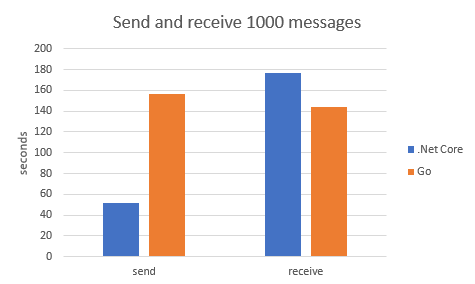 Go or GoLang is an open source programming language. It’s a server-side C like language created by Google. I won’t take much or your time to introduce you to the language, but here is a short summary why it’s worth trying.
Go or GoLang is an open source programming language. It’s a server-side C like language created by Google. I won’t take much or your time to introduce you to the language, but here is a short summary why it’s worth trying.
- Go is open-source, but backed up by Google and used by big companies (Google, Dropbox, Docker, etc.)
- It is something we know, it resembles C++ and it is easy to read
- It’s fast, it compiles directly to machine language, no virtual machine in the middle
- It’s a modern language, with packages instead of classes
- Unlike many older languages, Go is designed to work in parallel
The easiest way
I found a package on github: https://github.com/michaelbironneau/asbclient. I needed to modify it a bit to work properly, so I forked that into my repo: https://github.com/mikuam/asbclient.
I found an existing sample and provided my credentials.
package main
import (
"fmt"
"log"
"github.com/michaelbironneau/asbclient"
)
func main() {
i := 0
log.Printf("Send: %d", i)
namespace := "bialecki"
keyname := "RootManageSharedAccessKey"
keyvalue := "[SharedAccessKeyValue]"
client := asbclient.New(asbclient.Topic, namespace, keyname, keyvalue)
err := client.Send("go_testing", &asbclient.Message{
Body: []byte(fmt.Sprintf("message %d", i)),
})
if err != nil {
log.Printf("Send error: %s", err)
} else {
log.Printf("Sent: %d", i)
}
}
And result can be seen very fast:

Receiving Service Bus message is also trivial with this package and takes only a few lines of code. It looks like this:
package main
import (
"log"
"github.com/mikuam/asbclient"
)
func main() {
namespace := "bialecki"
keyname := "RootManageSharedAccessKey"
keyvalue := "[SharedAccessKeyValue]"
client := asbclient.New(asbclient.Queue, namespace, keyname, keyvalue)
log.Printf("Peeking...")
for {
msg, err := client.PeekLockMessage("go_testing", 30)
if err != nil {
log.Printf("Peek error: %s", err)
} else {
log.Printf("Peeked message: '%s'", string(msg.Body))
err = client.DeleteMessage(msg)
if err != nil {
log.Printf("Delete error: %s", err)
}
}
}
}
It works, simple as that. So…
How fast is it?
Let’s say I need to send 1000 messages and receive them. As asbclient package supports only sending messages one by one, I will implement the same logic in .Net Core app. Sending part can look like this:
public async Task Send1000()
{
var queueClient = new QueueClient(ServiceBusConnectionString, "go_testing");
for (int i = 0; i < 1000; i++)
{
await queueClient.SendAsync(new Message(Encoding.UTF8.GetBytes("Message number " + i)));
}
}
And receiving part:
public void ReceiveAll()
{
var queueClient = new QueueClient(ServiceBusConnectionString, "go_testing");
queueClient.RegisterMessageHandler(
async (message, token) =>
{
var messageBody = Encoding.UTF8.GetString(message.Body);
Console.WriteLine($"Received: {messageBody}, time: {DateTime.Now}");
await queueClient.CompleteAsync(message.SystemProperties.LockToken);
},
new MessageHandlerOptions(async args => Console.WriteLine(args.Exception))
{ MaxConcurrentCalls = 1, AutoComplete = false });
}
So what are the times for 1000 messages?

All code posted you can find it my github repo, go code itself is here: https://github.com/mikuam/Blog/tree/master/Go/src
You can read more about Service Bus in .Net Core in my post: Receiving messages from Azure Service Bus in .Net Core.